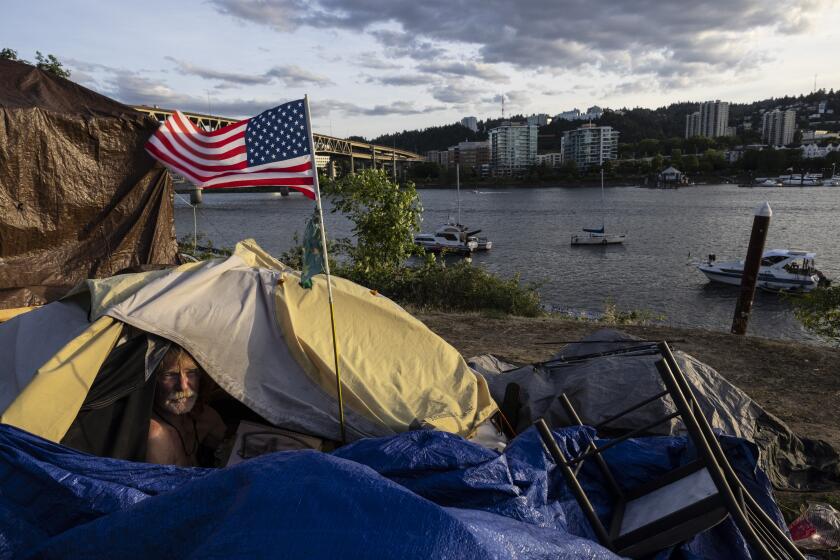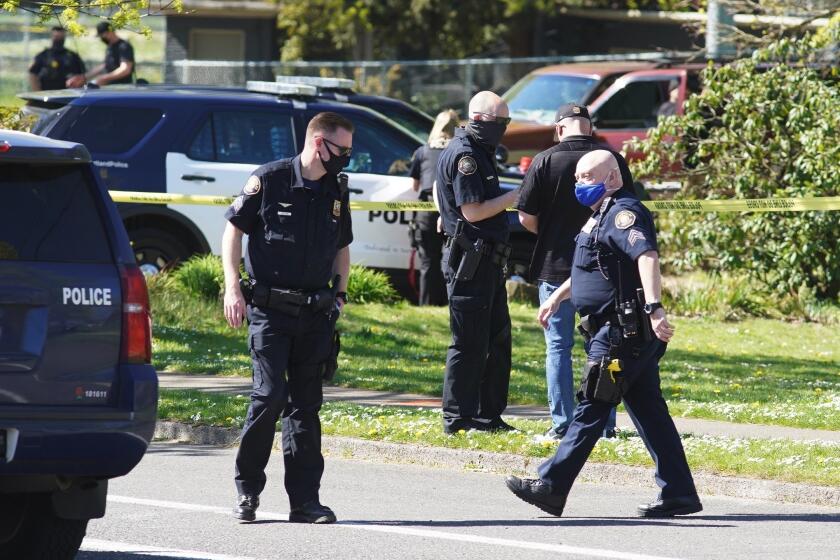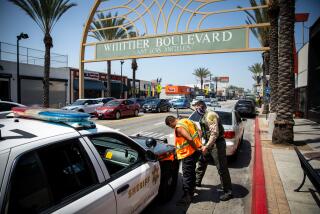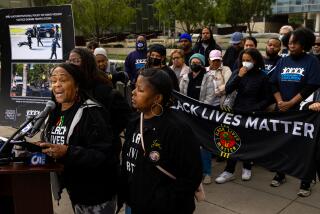Portland police will pull back on minor traffic stops amid racial disparity
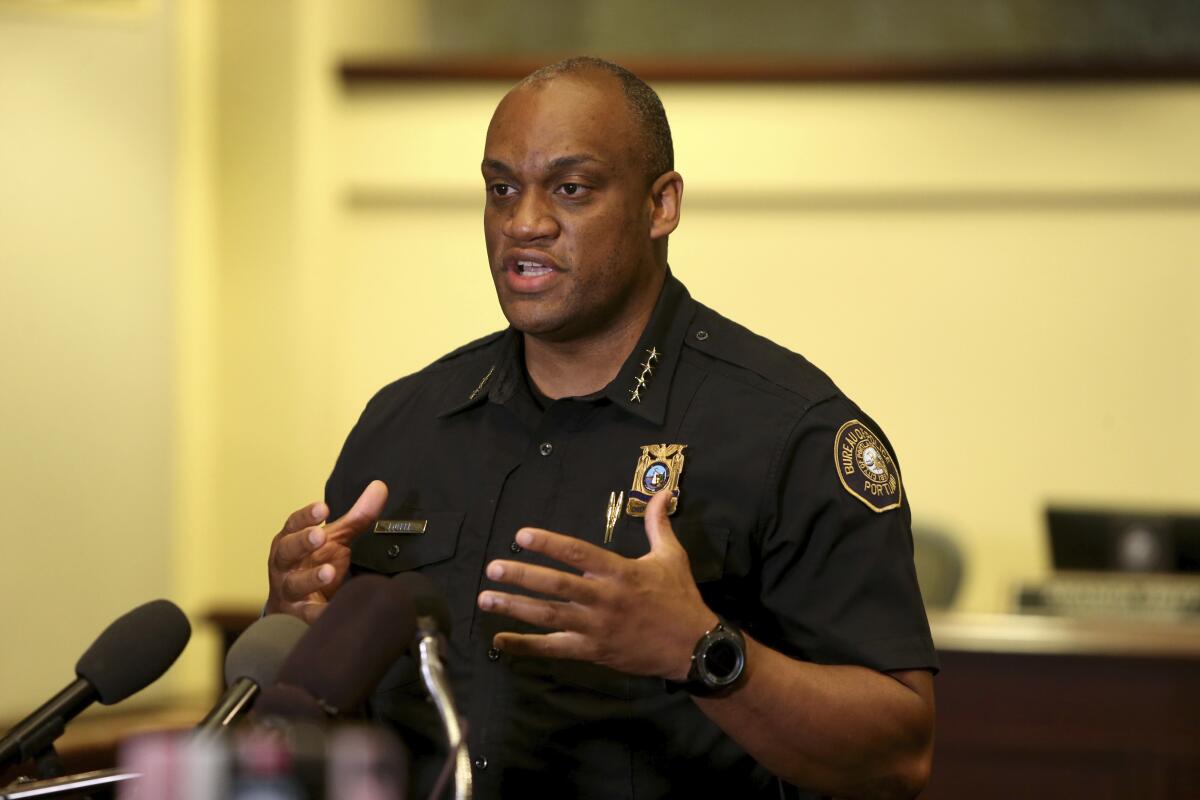
- Share via
PORTLAND, Ore. — Police in Oregon’s largest city are being advised to no longer pursue low-level traffic infractions — including expired plates and broken headlights — unless related to an immediate safety threat, Portland Mayor Ted Wheeler announced this week.
In addition, if police do stop a driver, they must receive recorded consent before searching the vehicle and clearly inform the person he or she has the right to refuse.
Wheeler said Tuesday that both changes are an attempt to refocus on immediate threats and are occurring in response to data showing a disproportionate impact on Black drivers for traffic stops and vehicle searches. Though 6% of Portlanders are Black, he said Black motorists account for 18% of traffic stops in the city.
“The goal of these two changes is to make our [approach] safer and more equitable,” Wheeler said.
Portland is not the first large city to make such a move regarding traffic stops. Oakland has had a similar policy for several years.
Until a year ago, Portland, Ore., was best known nationally for its ambrosial food scene, craft breweries and ‘Portlandia’ hipsters.
Portland Police Chief Chuck Lovell said that while officers are being directed to halt pulling drivers over for low-level traffic violations, they will still use their judgment if the violation is an immediate threat.
For example, a car driving at night without lights, although a minor infraction, would be considered an immediate safety issue and could be pulled over.
Wheeler noted these changes are also being done in part because of the police bureau’s limited resources. “Our staffing on the streets is inadequate,” he said.
Currently, the Police Bureau, which is struggling to find its grounding in the liberal city, is at its lowest staffing in decades — the department is about 150 officers short of “authorized strength.”
In the last nine months, the department has experienced a rapid turnover with more than 120 officers having left, many citing low morale and burnout from racial justice protests that would end in confrontation and plumes of tear gas.
The situation reached a breaking point last week when 50 police officers who serve on a specialized crowd-control unit and respond to Portland’s ongoing protests resigned en masse from the squad, but not the department.
The unit was on the front lines of nightly racial justice protests following the murder of George Floyd, and was tasked with dispersing groups after a riot was declared. Officers oftentimes were met with fireworks, rocks and glass bottles being thrown at them.
A video that shows a portion of a recent deadly police shooting in Portland, Ore., has circulated on social media and evening news broadcasts.
The move by officers to disband their own team came a day after a team member was indicted and accused of fourth-degree assault stemming from a baton strike against a protester last summer.
While officers’ priorities had shifted to protests last year, Portland was also experiencing its deadliest year in more than a quarter-century.
Gun violence has spilled over into this year, with at least 42 homicides so far. If nothing changes, Portland will surpass its all-time record for homicides of 70 set in 1987, when the city was in the midst of a gang siege.
Police estimate half of Portland’s more than 500 shootings this year, which have injured more than 140 people, are gang-related. In May, Wheeler warned that perpetrators are being told by gangs to shoot someone within 30 days or be shot and that people are traveling from other states to engage in violence in the Rose City.
While longtime residents say the gun violence in the city is the worst they have ever seen, police are struggling to find the resources, officers and funds to fully address it.
Last month, the City Council voted to create a team of 12 officers and two sergeants to tackle gun violence, but with no additional funds.
Lovell said the department is “so lean right now” that officers would probably be pulled from patrol, domestic violence or human trafficking investigations to support the new team.
Despite police pleas for more personnel, city leaders slashed $27 million from the police budget last year — $11 million due to the pandemic-caused budget crisis and $15 million amid calls to defund the police — vowing to devote money to community groups working to curb gun violence.
More to Read
Sign up for Essential California
The most important California stories and recommendations in your inbox every morning.
You may occasionally receive promotional content from the Los Angeles Times.
